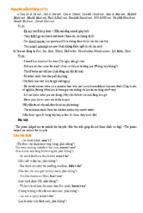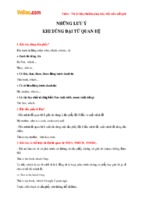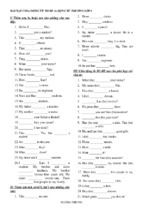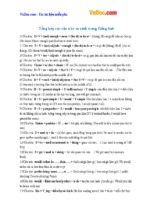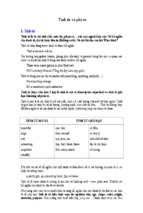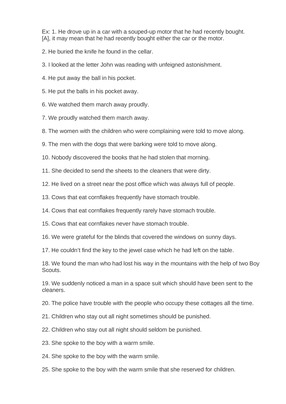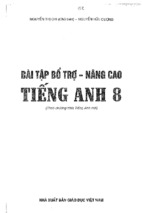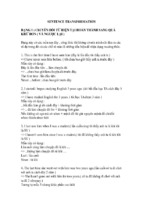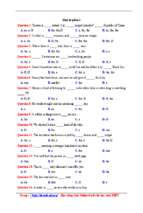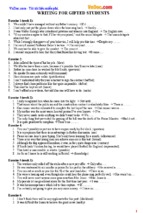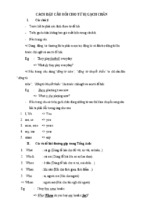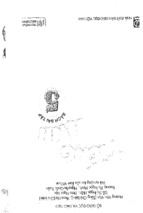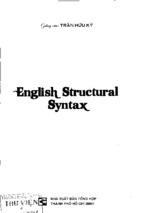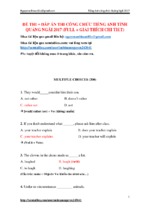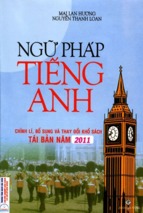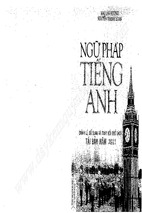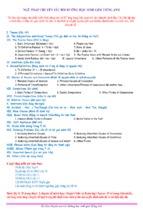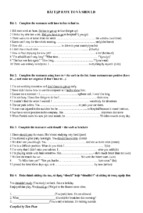English grammar in context
Michael Vince
acmillan
nglish
rammar
In Context
Intermediate
with key
Aa~ 4l!M
ale!pawJalul
lxalUOJ ul
JEWWEJ
4S!l6u
. UEII!WJE
Macmillan Education
Between Towns Road, Oxford OX4 3PP
A division of Macmillan Publishers Limited
Companies and representatives
ISBN 978-1-4050-7140-6
ISBN 978-1-4050-7141-3
throughout
the world
(with key edition)
(without key edition)
Text © Michael Vince 2007
Design and illustration
© MacmilIan Publishers Limited 2007
First published 2008
AlI rights reserved; no part of this pubIication may be reproduced, stored in a retrieval
system, transmitted in any form, or by any means, electronic, mechanical, photocopying,
recording, or otherwise, without the prior written permission of the pubIishers.
Design by Bigtop
Original design by Giles Davies
IIIustrated by Andy Hammond, Joanna Kerr, Darren Lingard, Sarah Nayler, Andrew Selby
Cover concept by GiIes Davies
Cover design by Katie Stephens
Cover photographs by Corbis, Digital Vision, Photodisc
The authors and pubIishers would like to thank the folIowing for permission to reproduce
& bbc.
their material: Extracts from websites bbc.co.uk/schools/gcsebitsize/business
co.uk/schools/gcsebitesize/physics
copyright © bbc.co.uk reprinted by permission of the
pubIisher. Extract from www.equityschooltravel.co.uk
copyright © Equity Educational
Tours, reprinted by permission of the pubIisher. lnformation 'Changing cities and urban
challenges' from Letts Revise KS3 Geography by A. ArnelI & A. Browne; copyright © Letts
2004, reprinted by permission of the pubIisher, Huveaux Pic. lnformation 'Energy and
electricity' from Letts Revise KS3 Science by B. MacDuell & G. Booth, copyright © Letts
2002, reprinted by permission of the pubIisher, Huveaux Pic. Extracts trom 'Weather and
Climate' (Usborne Science & Experiments) copyright © Usborne Publishing Limited 1992,
reprinted by permission of the pubIisher. Extract horn 'Apple Computers - The Early Years'
taken from http://en.wikipe~U!(
you
Complete the text with the affirmative,
.
, j
~,\,
(produce)
How many times a day
in and out? (breathe)
What a (do) ..
•
~
(h ave)
faster in hot weather?
(grow)
the
heart
f How long
to pump
blood around the body? (take)
muscles
g
ar push? (pull)
h Which vitamin
?
the liver
7
Brain
/
Muscle
Skin
\)
(
negative or question form of the verbs in brackets.
...dQ
the body.
to proteet itselP Your body
harmful microarganisms entering and causing harm. The skin, for
example, c (allow)
microorganisms to enter. Hairs and mucus in your nose
d (catch)
invaders, and then you
e (push)
the mucus out when you
cough, sneeze or blow your nose. Enzymes and acids in the body, and white blood cells also
f (destroy)
bacteria.
g (help)
antibiotics
?
antibiotic drugs to fight bacterial infections, but antibiotics
against viruses. This is why doctors
common cold ar fiu.
i (give)
How k (work)
Doctors h (use)
i (work)
antibiotics to patients with a
immunization
?
Immunization
(ar vaccination) is another way of protecting the body, by injecting the body with dead or
inactive microorganisms. After vaccination, the body I (start)
to make
antibodies that destroy the microorganism. Because the microorganisms in the vaccination are
not dangerous, the person m (get)
n (come)
into contaet with a hve (dangerous) micro organism, then the
antibodies o (destroy)
1
Make a list of five facts from this unit which
interest or surprise you.
2
Write ten sentences about your routines
and habits.
iII. When they
the infection before it makes them m.
6
Complete
the text with the present
Population a (mean)
simple or present
continuous
forms of the verbs in brackets.
the number of people who live in a particular area.
MC,tU'l.S
The population of the world b (not stay)
the same.At the moment it c (grow)
... at an increasing rate.ln fact, scientists d (believe)
that the world
population will increase until 2200, and then stop growing. However, things are not the same in all parts of the
world. At present in manyWestern
This f (happen) .
industrial countries the population e (fali)
.
because families are smali, and health conditions are good.
In developing countries, on the other hand, the population
g (rise)
sharply. In Ghana, for
example, most families h (have)
several children. Many children in Ghana
i (die)
from illness, so it is
important to have lots of children.They earn money
for the family and j (Iook after) ..
their parents in old age.
7
Complete the sentence
in brackets.
a Everybody
with the present
(know)
acc,.Jisa';)';)c,ariaq
b Although rainforests
b1.OWS
simple or present
continuous
form of the verb
that the world's rainforests
.
(cover)
(disappear)
only six per cent of the Earth's land
about 50% of all species of life on
surface, they (contain)
the planet.
carbon dioxide
c They also (remove)
(C02) from the air and (produce)
..oxygen (02).
d As they are important,
e Most scientists
f
why (they / vanish)
(agree)
?
that there are two main reasons.
First of all, the way of life in these forests (change)
g In some forests, big companies
(deforestation)
(cut)
down more and more trees
and (cause)
h In other places, another
Here farmers (bum)
kind of deforestation
damage to the land.
(happen)
more and more of the forest and (use)
..the land to feed cattle.
Vl
Now that govemments
(understand)
to control these activities.
the problem,
they (begin)
:J
O
:J
C
.....
C
O
1
2
Write five true sentences about your continuing
activities, with team, read, write, study and try to.
u
.....
C
(])
Write five true sentences about yourself, people you
know, your school etc deseribing changing situations.
Vl
Need more practice? Go to the Review on page 192.
G
(])
!>...
Q.
past simple
(FORM)
affirmative
I / You / We / They / She / He / It
stopped.
negative
1/ You / We / They / She / He / It
did not (didn't)
stop.
questions
Did
did
did
When
What
wait?
I / you / we / they / she / he / it
Leonardo da Vinci
Leonardo da Vinci
live?
paint?
short answers
Yes,
1/ you"/ we / they / she / he / it
did.
No,
I / you / we / they / she / he / it
didn't.
spelling rules
•
Verbs end ing in e, add -d:
decide - decided
•
For one-syllable verbs ending one vowel + one consonant,
double the consonant and add -ed:
stop - stopped
•
Other one-syllable
wait - waited
•
Verbs end ing vowel + consonant + y, change
Note: verbs ending vowel + y add -ed:
•
Two-syllable verbs end ing one vowel + one consonant,
double the consonant if the stress is on the last syllable and add -ed:
prefer - preferred
If the stress is on the first syllable, add -ed:
profit
•
verbs add -ed:
irregular verbs
Many verbs have irregular
-y to -i
and add -ed:
(see List of irregular verbs page 206)
past simple forms eg
drink - drank
study - studied
play - played
- profited
see -saw
@
Use past simple
•
to talk about finished events in the past, when we think about a definite
Alexander's army marched beside the river and then stopped outside the city
time.
•
to describe the events in a story.
•
to describe habits and routines in the past. We usually use a time word or phrase.
Leonardo painted in his studio every day.
Oliver heard the 50und of a bell. Soon afterwards, the door softly opened.
Subject and object questions
What did Leonardo paint?
Who painted this portrait?
are bot h possible with past simple (see Unit 1).
object question: + auxiliary did
subject question: no auxiliary did
Examples of time words and phrases we use wit h past simple:
o
-
yesterday
on Tuesday
last night
at 6.30
in 1754
in January
last week
an hour ago
last year
after that
1
Complete the sentence with the past simple form of the verb in brackets.
a Aztec civilization (develop)
b The Aztecs (leave)
c They (believe)
for a new land.
d They (arrive)
e They (build)
f They (plant)
.J~v~IQ9~J in the Valley of Mexico, 7,500 feet above sea level.
their own land of Aztlan at some time during the 12th or 13th century.
that Huitzilopochtli their war god (want)
them to search
in the Valley of Mexico during the 12th or 13th century AD.
their capi tal city, Tenochtitlan, on an island in Lake Texcoco.
trees on the island to make the land better, (work)
(improve)
the land.
g When the Spanish (arrive)HH
that Cortez was a returning god.
hard and
in 1519, Montezuma, the Aztec ruler, (think) ..
h When the Spanish (see)
the Aztecs' gold, they (decide)
to conquer the city.
Later they (kill)
Montezuma, (defeat)
the Aztecs and (destroy)
..Aztec religion and culture.
2 Complete the sentence with the past simple form of the verb in brackets. Then decide if each
sentence is True or
a
b
c
d
e
f
g
False.
Check the factual answers on page 208.
Greek actors (wear)
WQr~
masks and special boots. TrL.l1:Spartan children (take)
baths only two or three times a year.
The philosopher Socrates (drink)
poison and died.
Alexander the Great's army (go)
as far as China.
Heron of Alexandria (make)
a kind of jet engine.
The Roman Emperor Caligula's name (mean)
'Happy Soldier'.
Roman mathematics (have)
no zero.
h Most Roman girls (get)
Roman soldiers (pay)
The Romans (know)
3
married at the age of 18.
for their own equipment and food.
how to make soap and cement.
Seven of the sentences (including the example) contain historical errors. Guess which ones are wrong
and rewrite them with a negative past simple form. Check the factual answers on page 208.
a Alexander the Great married Cleopatra .
...AI~x:el'1.d~c
..lh~ ...G.cl:-tll..diJl'1..\l..Merrlj ..CIe.QptllriJ....
b Nelson Mandela became President of South Africa in 1994.
c Leonardo da Vinci invented the Internet.
d Confucius the Chinese philosopher died in 1900.
e Marco Polo stayed in China for five years.
f The ancient Romans used steam engines in their battles.
(1)
Q.
g Genghis Khan invaded Italy and captured Rome.
h Christopher Columbus reached America by accident.
William Shakespeare wrote Don Quixote.
E
lI'l
+'
lI'l
CO
Q.
G)
4
Complete the question for each answer.
The Industrial
a When
Revolution
in Britain
J.iJ±~?JVlJ.~~±[iel'R?Y91~±i9Vl~epp?t1,JVl13[i±eiVl"...
?
The Industrial Revolution lwppened during the second half ofthe 18th cen tury in Britain.
b How
..
...
?
Work changed with the building oflarge factories.
c What.........
'0
•••••••••••••••••••
• ••••••••
?
The first factories produced iron, steel, and textileso
d What..,
..
........
?
lV'ew technology encouraged the production of more ships, and railway equipment.
e What power .......,
?
,..
Factories used steam power.
f What
.
. ?
These factories required lots of coal for the steam engines.
?
g Where
MamLfactumos constructed their factories close to coal mines.
.
h Why ....
?
They decided to do this because it was expensive to transport coal.
What
.
......?
Factories also needed limestone and iron ore, for the manufacture
Where .....
.
.0
of steel.
"O
••
Industry in the UK developed near the coal fields of South Wales, the Midlands, north-east
England and central Scotland.
5
Rewrite each statement about the playwright
William Shakespeare as a yes I no question.
a He came from a rich family.
Q .....QjJ ..he.- ...cOMi:.-..±rOI1A..a ..rjdL+tlMjlij
...
?
A No, not rea/ly. His father was a glove maker.
b He grew up in London.
Q
?
A No, in Stratford upon Avon, a sma/l town about 160 km (rom London.
c He went to school.
Q
?
A Yes, we think so.
d He knew Latin.
Q
......?
A Yes, he learnt Latin at school, and some Greek as we/l.
e He got married.
Q
?
A Yes, he was only 18 when he married Anne Hathaway, aged 26.
f They had children.
Q
A Yes, a daughter Susanna, and twins, a boy Hamnet and a girl Judith.
?
?
g He began writing plays in Stratford.
Q
?
A We don/t really know. We only know that after 1592 he was an actor and writer in London.
h He wrote 37 plays all by himself.
Q
?
A Well/ we know he wrote two plays together with John Fletcher. Some people think that
all his plays were really written by somebody else.
He made up all the characters and plots of his plays.
Q
?
A Actually no. He borrowed lots of ideas (rom other writers. This was quite usual in his time.
He became rich and famous.
?
Q
A He certainly became quite rich/ and his plays were popular. But he only became really
famous in the 18th cen tury and later.
Complete the text wit h the past simple affirmative,
negative or question forms of the verbs in brackets.
Louis Pasteur 1822-1895
As a young man, Pasteur a
sludiecd
he b (become)
at the Ecole Normale in Paris. Then at the age of just 32,
a professor at the University of Lille. In 1856, Pasteur c (receive)
..a visit from a man called Bigo who d (own)
e (make)
a factory that
alcohol from sugar beet. He f (have)
a question for
Pasteur: why g (the alcohol / tum / to acid?)
h (hap pen)
, they
? When this
i (not can)
use it and j (throw)
..it away Bigo k (ask)
At first, Pasteur
I (not know)
Pasteur to find out the reason for this.
..
.
, but when he m (examine)
..the alcohol under a microscope, he n (find)
..thousands of tiny micro-organisms.
p (cause)
He
o (believe)
that they
the problem. q (milk, wine and vinegar / behave /
in the same way?) ..
...1
Other scientists r (disagree)
s (make)
with him, and newspapers
fun of him. However, Pasteur
t (continue)
with his work, he u (invent) ..
methods of testing his theory and v (prove) ..
that he was right. Later he w (work)
doctors and x (develop)
anthrax and rabies.
together with two
vaccines for diseases such as
OJ
Q.
1
2
Write five sentences about a famous historical figure from your country.
E
Write ten true things that you did, using the time words and phrases on page 14.
+-'
Need more practice? Go to the Review on page 192.
Q.
Vl
Vl
ro
G
past' continuous,
used to do
(FORM)
affi rlTiative'
I / She/ He / It
was
You / We / They
were
reading.
negative
I / She / He / It
was not (wasn't)
were not (weren't)
You / We / They
looking.
questions and short answers
Where
What
I / she / he / it
you / we / they
Was
Were
was
were
he
they
waiting?
watching?
waiting?
wearing?
Yes, I was.
you were.
No, I wasn't.
you weren't.
@D
Use past continuous
• for a continuing unfinished action in the past.
When Sue arrived at 930 am, four people were waiting
continuing past action
PAST
,
outside the office.
'~.
completed past event
~ ..~~-~~,
were waiting
PRESENT
arrived
• for a continuing unfinished action interrupted by a sudden past action.
While we were doing the maths test, the fire alarm went off
• for activities as background description.
The rainforest was fuli of saunds. Birds were calling from the trees and
thousands of insects were buzzing and humming.
• for two continuing events happening at the same time.
While Cortes was ta/king
to the emperor; his army was taking over the palace.
while, when
•
Use while with past continuous for the time the event was happening.
•
Use when with past simple for actions.
• We can use other more descriptive time phrases instead of when.
At the moment
the earthquake struck, most people were going about thelr normallives.
habits in the past
For deseribing habits and states in the past, it is more natural to use used to + verb than past
continuous, especially when we make contrasts with the present. We do not mention the exact date.
Used to is unchangeable, and has only a past tense form.
Question: Did you use to?
Negative: didn't use to
Rainforests used to cover a third of the Earth, but naw they are getting smaller.
Once people didn't use to worry about this problem.
What games did you use to play in the playground at school?
G
Note: we also use past
People once thought
simple
(+ frequency adverb) to describe habitual actions in the past.
that the Sun travelled round the Earth
1
Underline the correct form.
a While he took / was taking a bath, Archimedes discovered / was discovering the principles of
density and buoyancy.
b When Edouard Benedictus, a French scientist, worked / was working in his Iaboratory, he
dropped / was dropping a glass bottle which had same pIastic inside - and invented / was
inventing safety glass.
c Columbus arrived / was arriving in America while he tried / was trying to reach the Far East.
d AIexander FIeming discovered / was discovering penicillin by accident while he looked / was
looking at some old experiments.
e While Hiram Bingham climbed / was climbing in the mountains of Peru in 1911, he discovered
/ was discovering the Iost city of Macchu Picchu.
f While Isaac Newton sat / was sitting under an appIe tree, an appIe (ell / was (alling on his
head, and he understood / was understanding gravity.
g While Dr Harry Coover tried
/ was trying to invent a new
kin d of pIastic, he made
/ was making a very soft
substance which stuck / was
sticking things together. It was
SupergIue.
h While he observed / was
observing the Moon through
his teIescope, Galileo realized
/ was realizing that it had
mountains and craters.
Maeehu
28
2A Use the prompts to make a question. The answers
are in Exercise 1.
Picehu
Complete the sentence with the past continuous
form of the verb in brackets. The sentences refer to
Exercise 1.
a Where / Edouard Benedictus / work when he
f Edouard Benedictus (not try) ..
invented safety glass?
....lNh&r&.w,:;:{s ..~JQu,:;:{rJ.J;3&I'l.&diclus
...wQrtil'l.q
...wh.&I'l. h.&..iI'l.V&l'l.l&d ..s,:;:{:f&l?j ..q(,:;:{SS....
.
.
?
b Where / Columbus / try to go when he reached
America?
to invent safety glass .
g AIexander Fleming (not hope) ..
o
"'O
?
to discover penicillin.
h Hiram Bingham (not Iook for) ..
the Iost city of Macchu Picchu.
Isaac Newton (not sit) ..
?
an experiment to discover a kind of glue.
?
::J
O
C
in his study when he understood gravity.
Dr Harry Coover (not conduct) ..
e What Galileo / Iook at / through his teIescope?
~
~
::J
?
d What / Dr Harry Coover I'hope to invent?
OJ
Vl
c Where / Isaac Newton / sit according to the
story about gravity?
B
"'O
+-'
C
O
u
+-'
VI
ro
Q..
G
- Xem thêm -


